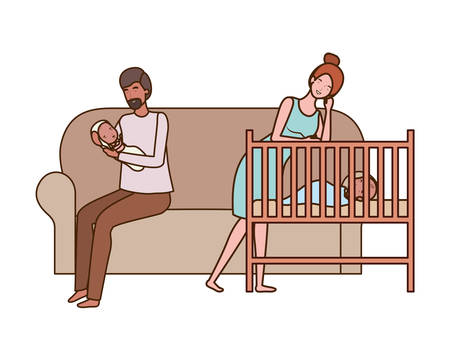Understanding Your Role as a Stepdad
Stepping into the shoes of a stepdad in a British blended family can feel both daunting and exciting. In the UK, the traditional notion of “family” is evolving, and more households are made up of diverse family structures than ever before. As a stepdad, your role may not always be clearly defined, and expectations can vary widely between families. Some children might look to you for guidance and support, while others may take time to warm up or prefer to keep their distance initially. It’s important to recognise that you are not replacing anyone; instead, you’re adding a new dynamic to the family unit. Embrace this unique position with patience and empathy—British culture often values modesty, respect for personal boundaries, and a good sense of humour. Take the time to understand each family member’s perspective and communicate openly about your role. By doing so, you’ll begin to build trust and lay the foundation for strong relationships within your blended household.
Building Trust and Relationships with Stepchildren
As a British stepdad, one of your first challenges is to establish trust and develop meaningful relationships with your partner’s children. The UK’s family landscape often values privacy, respect for personal space, and subtlety in emotional expression. Successfully navigating these nuances can make all the difference in how you bond with your stepchildren.
Tips for Forging Healthy Connections
Every child is unique, and age differences play a significant role in how you approach relationship-building. Here are tailored strategies that take into account typical British family dynamics:
| Age Group | Recommended Approach | Key Boundaries |
|---|---|---|
| Young Children (4-10) | Engage through shared activities such as board games, trips to local parks, or helping with homework. Keep things light and allow them to set the pace. | Respect their attachment to routines and biological parents; don’t rush affection or discipline roles. |
| Tweens & Teens (11-17) | Show interest in their hobbies—whether that’s football, music, or gaming. Offer support without prying, and be available for a chat during car rides or walks. | Avoid overstepping on discipline; collaborate with your partner for consistency. Give them space to process the new family structure. |
| Young Adults (18+) | Treat them as equals, listen to their opinions, and respect their independence. Invite them for pub lunches or family gatherings, but don’t force participation. | Recognise their autonomy and avoid imposing your own expectations on their life choices. |
Understanding British Family Boundaries
British families often place a high value on politeness and indirect communication. It’s important to be patient—trust is not built overnight. Start by supporting your partner’s existing rules and routines rather than introducing drastic changes. Even small gestures—like offering a cup of tea after school or remembering a favourite TV show—can help foster connection without overwhelming children who might already feel uncertain about their changing family dynamic.
Practical Do’s and Don’ts
- Do: Use humour to break the ice; it’s an integral part of British culture.
- Don’t: Try too hard to replace the biological parent; instead, offer support as an additional adult ally.
- Do: Communicate openly with your partner about boundaries and expectations regarding discipline and involvement.
- Don’t: Take resistance personally—adjustment takes time for everyone involved.
Nurturing Respectful Connections
The journey of becoming a trusted figure in your stepchildren’s lives requires patience, empathy, and adaptability. By appreciating age differences, respecting boundaries rooted in British culture, and progressing at a comfortable pace for all involved, you’ll lay the foundation for strong, lasting relationships within your blended family.

3. Working with Your Partner as a Team
One of the most crucial elements for step-dads in blended British families is maintaining a solid partnership with your other half. Presenting a united front provides stability and reassurance for all children involved, helping to set clear expectations and boundaries. This means standing together on important decisions, even if you don’t always see eye-to-eye behind closed doors.
Communicating Openly and Honestly
Open communication is the backbone of any successful relationship, but it’s especially vital when navigating step-parenting. Make time for regular check-ins with your partner—perhaps over a cuppa after the kids are in bed—to discuss what’s working and what needs tweaking. Be honest about your feelings and concerns, but approach sensitive topics with empathy. Remember, it’s natural to have different parenting backgrounds, so patience and understanding are key.
Navigating Parenting Disagreements
No two parents will agree on every aspect of raising children, particularly in a blended household where values and routines may differ. When disagreements arise, avoid heated arguments in front of the kids; instead, take discussions private and aim for compromise. It can help to establish some shared ground rules that reflect both your approaches—perhaps blending a bit of “old school” discipline with modern flexibility—so everyone knows where they stand.
Building Trust and Respect
Ultimately, working as a team means respecting each other’s opinions and trusting your partner’s instincts—even if their style isn’t quite like yours. By backing each other up and showing mutual support, you’ll model positive relationships for your children and create a more harmonious home environment. Remember: British families thrive on humour, patience, and pulling together during challenging times—qualities that will serve you well on this journey.
4. Managing Relationships with Biological Parents
Navigating the relationship with your stepchildren’s biological parent(s) can be one of the trickiest aspects of step-parenting, especially in British blended families where legal, social, and cultural expectations must be respected. The goal should always be to prioritise the children’s wellbeing while fostering a harmonious co-parenting environment. Here are some best practices tailored for UK dads:
Open and Respectful Communication
Establishing open channels of communication is vital. Always communicate directly and respectfully with the biological parent about matters concerning the children, avoiding using them as messengers. If necessary, use established tools such as email or family communication apps to keep records and reduce misunderstandings.
Understanding Legal Boundaries
The UK has clear laws around parental responsibility and child arrangements. As a stepdad, it’s important to know your rights and limitations—particularly if you do not hold legal parental responsibility. Always defer to court orders and formal agreements regarding custody, contact, and decision-making.
| Best Practice | Why It Matters (UK Context) |
|---|---|
| Respect existing custody arrangements | Avoids conflict and keeps within legal bounds |
| Share key information on schooling/health | Keeps both parents informed as per UK safeguarding norms |
| Avoid negative talk about the other parent | Protects children’s emotional wellbeing and prevents parental alienation |
Focus on the Children’s Wellbeing
Your actions should always centre on what’s best for your stepchildren. Encourage their relationship with their biological parent(s) unless there are safeguarding concerns. Remember that positive co-existence benefits the children emotionally and developmentally.
Troubleshooting Common Challenges
- If tensions rise, consider mediation services available in the UK such as Family Mediation Council-accredited professionals.
- If you feel excluded from key decisions, seek support via parenting groups or local councils for advice on constructive involvement.
When to Seek Professional Help
If disagreements threaten the children’s welfare or create ongoing distress, don’t hesitate to consult a family solicitor or child welfare professional familiar with British family law. Putting the children first sometimes means stepping back so that they can enjoy strong relationships with all their parents—biological or otherwise.
5. Navigating British Traditions and Family Rituals
Blended families in the UK often face the unique challenge of merging different backgrounds, customs, and expectations—especially when it comes to time-honoured British traditions. As a step-dad, your role is pivotal in helping everyone feel included and respected, particularly during holidays like Christmas, Easter, Bonfire Night, or even Sunday roasts. Here are some practical suggestions for embracing or blending family customs and establishing new routines that reflect your household’s unique identity.
Embrace Each Family’s Traditions
Start by recognising and respecting the traditions that each family member brings to the table. Have open conversations with your partner and step-children about what makes certain events special for them—whether it’s pulling crackers at Christmas dinner or attending the local village fete. Acknowledging these rituals helps everyone feel seen and valued.
Blend Customs Creatively
Find ways to combine elements from both sides. For example, if your step-children are used to a particular way of celebrating Mother’s Day or Father’s Day, consider how you might honour those customs while introducing something meaningful from your own background. This could be as simple as baking a traditional British Victoria sponge together or organising a picnic on a bank holiday Monday.
Create New Family Rituals
Sometimes, the best solution is to start fresh. Establishing new routines—like weekly board game nights, walks in the local park, or an annual trip to Blackpool—can help foster a sense of unity and belonging. These shared experiences will gradually become part of your blended family’s story.
Inclusion During Significant Events
The key during holidays and milestone events is ensuring no one feels left out. Assign roles so everyone participates: let each child choose a dish for Christmas dinner, or invite them to help decorate the house for Halloween. Ask for input on how to celebrate birthdays or anniversaries, making sure all voices are heard.
Be Open to Change
Remember that traditions can evolve over time. Be flexible if things don’t go perfectly straight away—it may take a few tries before new routines stick. The important thing is to keep communication open and maintain a spirit of compromise. By blending old and new traditions thoughtfully, you’ll help create lasting memories where everyone feels truly at home.
6. Looking After Your Own Wellbeing
As a stepdad in a blended British family, it’s easy to put everyone else’s needs before your own. However, prioritising your wellbeing is not selfish—it’s essential for you and your family’s happiness. Here’s how you can practise self-care and find support as you navigate the unique challenges of step-parenting.
Practising Self-Care
Self-care isn’t just about bubble baths or a pint at the pub (though both can help!). It means regularly setting aside time to recharge, whether through exercise, reading, or simply enjoying a quiet cuppa. Try to maintain hobbies that bring you joy and help you unwind. Remember, showing your children and stepchildren that looking after yourself is important sets a positive example.
Managing Stress Effectively
The pressures of blending families can sometimes feel overwhelming. If you notice stress building up, take a moment to breathe and assess what’s within your control. Practise mindfulness techniques—there are plenty of UK-based apps like Headspace or Calm—or try local yoga or meditation classes. Don’t hesitate to talk openly with your partner about how you’re feeling; sharing concerns often lightens the load.
Finding Local Support Networks
You’re far from alone on this journey. Across the UK, there are organisations and groups designed to support stepdads and blended families. Consider reaching out to charities like Family Lives or Gingerbread, which offer advice tailored for step-parents. Community centres often host parenting workshops, while online forums such as Netmums or Dad.info provide spaces to share experiences and seek guidance from others who understand British family life.
Professional Support When Needed
If things ever feel too much, don’t shy away from seeking professional help. Many GPs across the UK can refer you to counselling services specifically attuned to men and fathers. Sometimes, just talking things through with someone outside the family makes all the difference.
Ultimately, looking after yourself enables you to be the best dad—and stepdad—you can be. By embracing self-care, managing stress wisely, and tapping into local resources, you’ll not only support your own wellbeing but also foster a happier home for everyone in your blended family.


